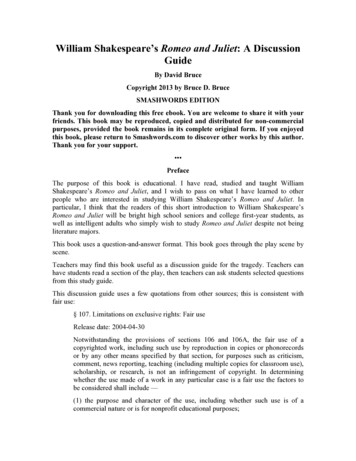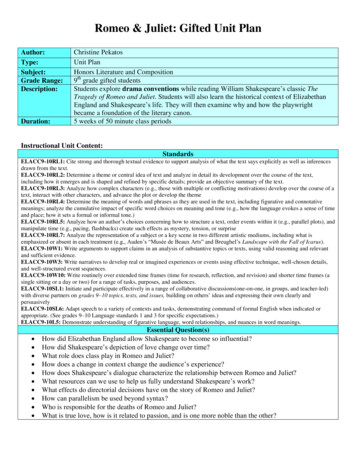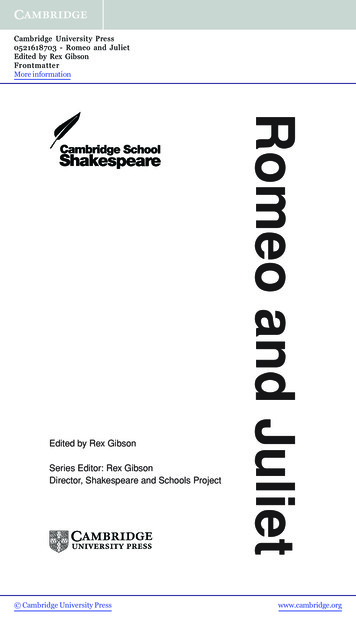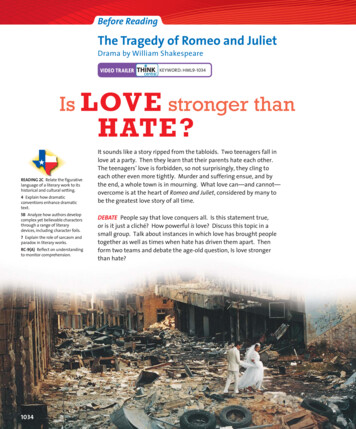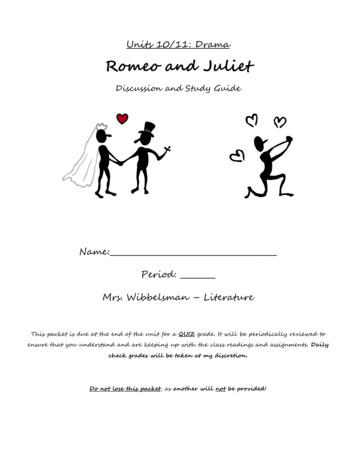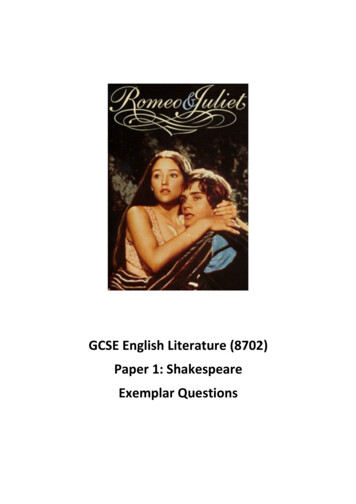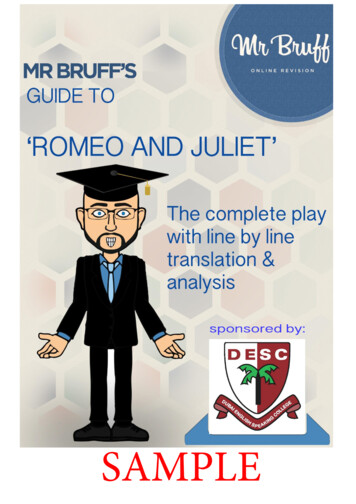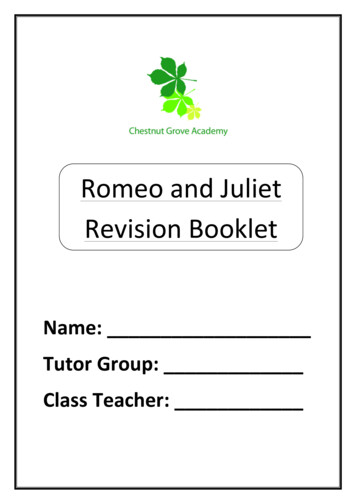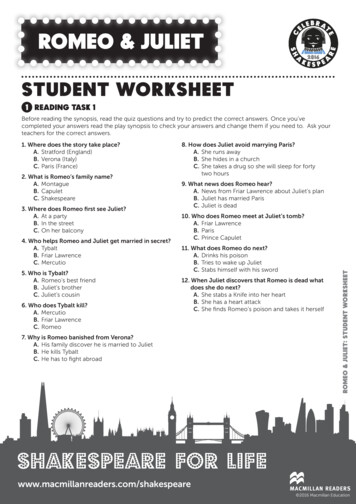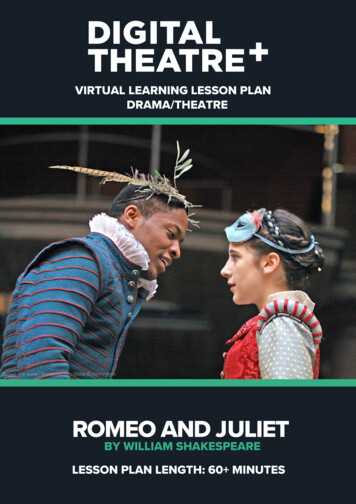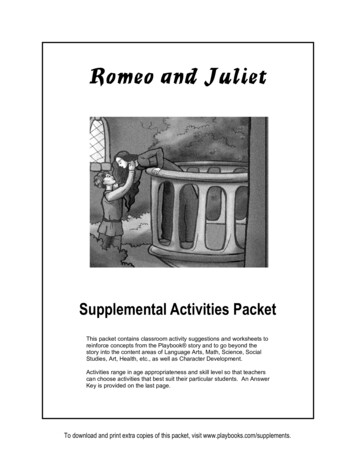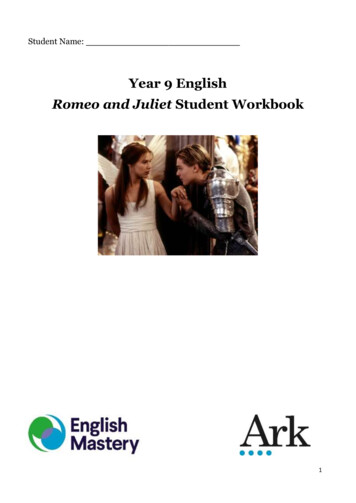
Transcription
Student Name:Year 9 EnglishRomeo and Juliet Student Workbook1
A special thanks to Sarah Twyman, Ark Bolingbroke Academy forthe adaption and formatting of this material.This workbook has been created to follow the English Mastery 6 HrTraditional Curriculum.This workbook is an optional supplement and should not replace the standardEnglish Mastery resources.It is specifically designed to provide consistency of learning, should anystudents find their learning interrupted.Due to the nature of the format – some deviations have been made from theEM Lesson ppts. These have been made of necessity and for clarity.2
Romeo and Juliet – Lesson 1Mastery Content: Shakespeare wrote comedies, tragedies, and history plays ‘Romeo and Juliet’ is a tragedy The play is set in the city-state of VeronaDo NowLots of people know about ‘Romeo and Juliet’from popular culture.Romeo Juliet (1996)A Monument Belongingto the Capulets (1789)Romeo and Juliet (1968)Vogue fashion shoot (2008)Write down a list of things you think you alreadyknow about the story of ‘Romeo and Juliet’.Task: Write a list of similarities between Midsummer Night’s Dream and The Tempest: 3
Task: Tick off any that you thought of. Highlight the key information. Both plays were comedies. There was a romantic plot in both stories (Helena-Demetrius, HermiaLysander; Miranda-Ferdinand). Nobody died in either story. Both plays had a happy ending. There is confusion around who characters really are (the love potionconfused Hermia, Helena, Lysander and Demetrius; Caliban thoughtthat the butler and jester were important people). Neither of the plays were set in England. ‘A Midsummer Night’s Dream’ was set in Ancient Greece; thecharacters in ‘The Tempest’ were from Milan and Naples. Both plays had magic in them. There was a love potion and fairies in ‘A Midsummer Night’s Dream’;Ariel and Prospero had magic powers in ‘The Tempest’. Daughters had to obey their fathers in both plays. Egeus tried to force Hermia to marry Demetrius in ‘A MidsummerNight’s Dream’; Prospero didn’t want Miranda to fall in love withFerdinand immediately in ‘The Tempest’.Task: If these are features of acomedy, what do you think thefeatures of a tragedy are?4
Vocabulary: TragedyVocabulary: TragicThe word ‘tragedy’ is a noun. It is anaming word:The word ‘tragic’ is an adjective. Itdescribes something as being very sad,or as part of a tragedy: ‘Romeo and Juliet’ is atragedy.It was a tragedy when we gotknocked out in the last secondof the game.The tragedy occurred on theEast coast at dawn thismorning. Thankfully, nobody died in thetragic accident.The radio played an oddlyappropriate backdrop to theevent, sounding slightly tragic.Friar Lawrence is one of the firstpeople to find the tragic bodiesof Romeo and Juliet.Task: What is the correct word to enter in these sentences: tragedy or tragic?1.2.3.4.5.6.‘Othello’ is another famousby Shakespeare.When he found out thenews, he had to leave work early.When thestruck, there was a special news bulletin.It was anight: nobody had showed up to the party.To begin with, the play seemed like a comedy, however, it had aThankfully the parachute opened in time and we avoided a.ending.5
Romeo and Juliet’: an introductionThe First FolioSeven years after his death, 36 of Shakespeare’s plays were publishedin a book now known as the First Folio. Not many people had theirplays published as it was very expensive and there was no guaranteethat the books would sell. The fact that Shakespeare’s plays wereprinted helps to show how popular his plays were when he was alive.The First Folio grouped his plays in three genres:1. Comedies, such as ‘A Midsummer Night’s Dream’, ‘Twelfth Night’, ‘The Tempest’ and‘All’s Well That Ends Well’.2. English History Plays, such as Henry IV, Richard II, and Richard III. The History Plays tellthe stories of the kings of England.3. Tragedies, such as ‘Romeo and Juliet’, ‘Macbeth’, ‘King Lear’, ‘Hamlet’, and ‘Othello’.Each genre of play has its own rules. Last year, we looked at the rules of a comedy whenwe studied ‘The Tempest’. This year, we will find out more about the conventions of aShakespearean tragedy. There are a number of different features that make a play atragedy, and Shakespeare was a master at writing in this genre.‘Romeo and Juliet’Shakespeare wrote during the Elizabethan era (1558-1603) and into the Jacobean era(1603-1625) until his death in 1616.‘Romeo and Juliet’ was one of his earlier plays, and was probably written in 1595, aroundthe same time he was writing the comedy ‘A Midsummer Night’s Dream’ (AMND). Eventhough one play is a comedy and one a tragedy, the two plays have a number ofsimilarities: they are both set in Europe (AMND in Athens; ‘Romeo and Juliet’ in Verona,Italy); they both have fathers who tell their daughters who to wed (Egeus and LordCapulet); and both contain love plots. However, the two plays end in very different ways:while AMND ends with all couples getting married and living happily ever after, ‘Romeoand Juliet’ ends with the tragic deaths of the two main characters.VeronaAs we have seen, Shakespeare enjoyed setting his playsoutside of England, where his plays were performed. Bysetting his plays away from home, Shakespeare invited theaudience into a new world of his creation, and gave them achance to escape their hard daily lives during their time inthe theatre.‘Romeo and Juliet’ is set in Verona, Italy. Like Milan andNaples in ‘The Tempest’, Verona was an Italian city-stateduring the Elizabethan era. A city-state is an area that isruled by a major city. Italy wasn't one unified country, but a number of small independentcity-states.The rulers of city-states had different titles. Kings, Queens, Princes, Dukes, and Lords couldbe rulers. The name changed between cities, but any of these titles could mean that youwere the ruler of a city. For example, in ‘The Tempest’, Prospero was the Duke of Milan,while Alonso was the King of Naples. In ‘Romeo and Juliet’, Prince Escalus is the Prince of6
Verona. Although there are two powerful families in the city called the Montagues andCapulets, they must obey the Prince’s laws.Due to the popularity of ‘Romeo and Juliet’, thousands of people travel to Verona todayto visit the city where the Shakespeare’s most famous tragic characters lived and died.Task: Answer these questions.1. What genres of plays did Shakespeare write?2. What era was ‘Romeo and Juliet’ written in?3. What similarities are there between ‘Romeo and Juliet’ and ‘A MidsummerNight’s Dream’?4. What similarities are there between ‘Romeo and Juliet’ and ‘The Tempest’?5. Why did Shakespeare set his plays outside of England?6. Where is ‘Romeo and Juliet’ set?Task: Why do people enjoy the genre oftragedy? What makes it such a populargenre?Exit Quiz – Which statements about Romeo and Juliet are correct?a) ‘Romeo and Juliet’ was written in the Jacobean era.b) It is similar to ‘The Tempest’ because both plays are tragedies.c) ‘Romeo and Juliet’ is set in the Italian city-state of Verona.d) A tragedy is the complete opposite of a comedy. The two genres have nothing incommon.e) ‘Romeo and Juliet’ ends with the tragic deaths of its heroes.7
Romeo and Juliet – Lesson 2Mastery Content: The plot of ‘Romeo and Juliet’The Prologue describes what will happen in the playThe Prologue is a sonnetThe Prologue outlines the main themes and conflicts of the play‘Romeo and Juliet’ has a number of tragic conventionsDo Now: Last lesson, we found out some information about the setting of ‘Romeoand Juliet.Make a list of at least four things you remember about the setting of ‘Romeo andJuliet’.1.2.3.4.Today, we will look at the plot of ‘Romeo and Juliet’.Before that, we will study the play’s prologue (pronounced pro – log).Vocabulary: PrologueA Prologue is an introduction to a book, film, or play.It comes from Greek, prologos (meaning: pro – before; logos – word )In ‘Romeo and Juliet’, the Prologue is spoken by a Chorus (kor – us).Vocabulary: ChorusIn this play, the Chorus acts as a narrator. They are not a part of the play; they sitoutside of what happens.In the Prologue, they tell the audience what will happen in the play. They help to setthe scene, and to prepare an audience emotionally for what is about to happen.8
Task: Read the modern version of the prologue and answer the questionsunderneath.Our story is set in the beautiful city of Verona, where two families of equal status renew anold argument and lead the citizens to fight and kill each other.The children of these two enemies become lovers and end their parents’ disagreementsby killing themselves.We will now spend the next two hours telling you the story of their love and how only theirdeaths could end their parents’ anger.If you listen patiently, we will fill in the gaps that this prologue leaves.1. Where is ‘Romeo and Juliet’ set?2. Who is arguing?3. What happens to the two lovers?4. What resolves the argument?The Prologue has given us an idea of some of the events of ‘Romeo and Juliet’.Now, let’s find out what happens in the play. To do this, we’re going to ‘Whoosh’ through‘Romeo and Juliet’.Task: Read each part of the play and write a summary of what happens for eachpart.Part 1: The ancient grudgeTwo members of the Capulet household are walking through Verona. When theysee two members of the Montague household walk by, the Capulets begin makingprovocative gestures at the Montagues. They square up to each other, and ascuffle breaks out. More members of both households join the fray, and the city isfilled with the sounds of swords swishing and striking each other (group makesnoise). Before anyone gets hurt, the Prince of Verona enters. He is the ruler of thecity, and his word is law. As soon as he enters, the fight stops. He tells everyone that9
any more fighting will be punished by death: ‘If ever you disturb our streets again,Your lives shall pay the forfeit of the peace.’Summary:Part 2: The Capulet’s masked ballLater that evening, Lord Capulet, the respected leader of the Capulet family,begins welcoming guests to a masked ball at his home. One of the first guests toarrive is Paris. Paris takes Lord Capulet to one side, and says that he wishes to marryhis daughter, Juliet. Lord Capulet says that Paris must try to win Juliet’s love: ‘wooher, gentle Paris, get her heart’.But it is not just friends and families of the Capulets at the ball. Romeo, Benvolioand Mercutio are members of the Montague family, sworn enemies of theCapulets. However, the three of them sneak into the Capulet ball, using masks tohide their identities.The three of them enjoy the drinks and music at the party, until Romeo spots LordCapulet’s daughter, Juliet, across the room. He falls instantly in love with her.Romeo approaches Juliet and they talk, flirt and kiss. Romeo, Benvolio andMercutio have to leave the party quickly before they are recognised asMontagues. Juliet is heartbroken when she discovers that Romeo is a Montague.Summary:Part 3: Romeo and JulietAlthough he has left the Capulet’s masked ball, Romeo still lingers in their garden.He sees Juliet appear at a balcony above him. He can’t believe how beautiful sheis: ‘But soft, what light though yonder window breaks? It is the east, and Juliet is thesun.’ Juliet doesn’t know that Romeo is stood below her, listening to what she says.Juliet is upset that Romeo is a Montague, her family’s sworn enemy: ‘O Romeo,Romeo, wherefore art thou Romeo?’ Romeo steps forward, and the two lovers talkand fall deeper and deeper in love. Juliet says that if Romeo’s love is true, he will10
agree to marry her the next day: ‘If that they bent of love be honourable, Thypurpose marriage, send me word tomorrow.’ Romeo swears that he loves Juliet,and the next day, they get married in complete secrecy.Part 4: Romeo’s banishmentRomeo’s Montague friends, Mercutio and Benvolio, are strolling through the hotVerona sun. They encounter Juliet’s cousin Tybalt, a Capulet. They circle eachSummary:other, knowing that starting a fight will lead to their execution after the Prince’swarning. Romeo arrives, and Tybalt begins taunting him, saying, ‘thou art a villain’.But, through his marriage to Juliet, Romeo is now Tybalt’s family, and Romeo doesnot want to hurt him. Romeo knows that he cannot say anything about thewedding, and he refuses to fight Tybalt.Mercutio is outraged by – what he thinks is - Romeo’s cowardice. Mercutio beginsa deadly sword fight with Tybalt, and Tybalt strikes Mercutio with a fatal blow. Ashe lay dying, Mercutio curses the pointless grudge between the two families: ‘Aplauge a’both your houses!’, then dies.Even though Romeo is now Tybalt’s family, he cannot let Mercutio’s death gounpunished. Romeo fights with Tybalt, and kills him dead. Romeo flees.The Prince enters, and sees both Mercutio and Tybalt dead on the ground. Forkilling Tybalt, the Prince banishes Romeo from Verona, never to return: ‘And for thatoffence Immediately we do exile him hence.’Summary:Part 5: Juliet’s woes11
Summary:Juliet sits alone in her bedroom. She doesn’t know what is worse: the death ofTybalt, her cousin, or the banishment of Romeo, her husband. When she thinks thatthings can’t get any worse, her mother, Lady Capulet enters. Lady Capulet is alsomourning the death of Tybalt, but she has some good news to soothe Juliet: it hasbeen agreed that Juliet will marry Paris in two days’ time. Juliet becomes evenmore upset: she refuses to marry Paris, and she can’t tell her parents that she isalready married to Romeo. Lord Capulet comes into Juliet’s room to find out whatSummary:all the fuss is about. At first, he is confused at Juliet’s refusal to marry Paris, but soonhis anger rises. Lord Capulet threatens to disown Juliet if she defies his orders: ‘Beyou mine, I’ll give you to my friend; And you be not, hang, beg, starve, die in thestreets.’ Mortified, Juliet runs out to seek the advice of Friar Lawrence, the manwho wed Romeo and Juliet in secret.Part 6: The Friar’s planFriar Lawrence and Juliet are discussing a plan. Juliet wants to avoid marrying Parisand be reunited with Romeo. The Friar comes up with a complicated plan. Hegives Juliet a potion that will make her appear to be dead. After her funeral,Romeo can enter her tomb at night and wait for the potion to wear off. WhenJuliet awakes, they can escape Verona and live happily together. Juliet can seethat the plan is filled with danger, but she knows she has no other option.Part 7: The plan unravelsThe Friar writes a letter to Romeo, explaining the plan. A messenger tries to deliverthe letter, but he is unable to get out of the city. Romeo does not know about theplan for Juliet to fake her own death.Back in her room, Juliet swallows the potion Friar Lawrence gave her. Herseemingly dead body is discovered, and the Capulets (whole class) mourn herdeath, even though she is actually still alive.12
Summary:Part 8: CatastropheRomeo hears of the death of Juliet. He does not know that she is actually still alive.Romeo sneaks back into the city at night. He enters the tomb where Juliet lay, andbelieves she is dead. He swears his love to Juliet and swallows a deadly poison:‘Here’s to my love! Thus with a kiss I die.’ Seconds later, Juliet awakes and findsRomeo’s body on the floor. After everything she has been through, this is too muchfor her to bear. She takes Romeo’s dagger and uses it to kill herself: ‘I’ll be brief. Ohappy dagger, This is thy sheath; there rust, and let me die’.The lovers’ bodies are discovered. The Prince enters, and demands to know whathas happened. Friar Lawrence comes into the tomb and explains his plan, andhow it ended so tragically. Lord and Lady Capulet and Lord Montague discovertheir dead children’s bodies in the tomb, and agree to end their savage andviolent feud. It has taken this bitter tragedy to bring peace to Verona.Summary:13
Task: Write a paragraph to answer this question. What makes ‘Romeo and Juliet’ atragedy?Exit Quiz – Which statements about Romeo and Juliet are correct?a) ‘Romeo and Juliet’ was written in the Jacobean era.b) It is similar to ‘The Tempest’ because both plays are tragedies.c) ‘Romeo and Juliet’ is set in the Italian city-state of Verona.d) A tragedy is the complete opposite of a comedy. The two genres havenothing in common.e) ‘Romeo and Juliet’ ends with the tragic deaths of its heroes.14
Romeo and Juliet – Lesson 3Mastery Content: The Prologue outlines the main themes and events of ‘Romeo and Juliet’ Romeo and Juliet are ‘star-crossed lovers’ The Prologue describes the tragic plot and themes of the playDo Now: This image illustrates what the Prologue is in ‘Romeo and Juliet.Today, we are going to read the Prologue to ‘Romeo and Juliet’ in detail.The Prologue is a famous and important part of the play. It contains: Details of the setting of the playA summary of the plot of the playInformation of the main conflicts and themes of ‘Romeo and Juliet’.15
Reading – Read the prologue.Two households, both alike in dignity,In fair Verona (where we lay our scene),From ancient grudge break to new mutiny,Where civil blood makes civil hands unclean.4From forth the fatal loins of these two foesA pair of star-crossed lovers take their life;Whose misadventured piteous overthrowsDoth with their death bury their parents' strife.8The fearful passage of their death-marked love,And the continuance of their parents' rage,Which but their children's end nought could remove,Is now the two hours' traffic of our stage;12The which if you with patient ears attend,What here shall miss, our toil shall strive to mend.1416
Task:Here are phrases that you will need to know: alike in dignity – equal in high statusbreak to new mutiny – start a new fightancient grudge –hatred that has lasted for a long timecivil means people living in the city‘where civil blood makes civil hands unclean’ The blood of the people in the citydirties the hands of others in Verona’.unclean means dirtyFrom forth the fatal loins of these two foes - conceived by deadly enemies‘fatal’ means deadly.‘star-crossed’ means ill-fated. Their destiny was tragic.‘piteous’ means tragic.Underline these phrases on your copy and write down what they mean in the margin.Task: Make any further notes from below on your copy.17
Task: Write a paragraph to answer the question below.How does Shakespeare make it clear to an audiencethat ‘Romeo and Juliet’ is a tragedy in the Prologue? In the Prologue to ‘Romeo and Juliet’,Shakespeare He tells us that the Montagues and Capulets. He describes Romeo and Juliet as The Prologue makes it clear that will happen Shakespeare makes it clear that the play is atragedy because Exit Quiz – Which statements are correct?a) ‘Star-crossed’ shows that Romeo and Juliet are famous characters: they aresuperstars.b) ‘Civil hands unclean’ proves that Romeo dies at the end of the play.c) The marriage of Romeo and Juliet ends the ‘ancient grudge’ between the twofamilies.d) The ‘civil blood’ suggests that there will be violence and death in the play.e) The Prologue rhymes, which means that it must be a sonnet.18
Romeo and Juliet – Lesson 4Mastery Content: The Montague and Capulet families hate each other violently The city of Verona is ravaged by the fighting between the two families The Prince says that any more fighting will be punished by deathDo Now: Why did Romeo and Juliet have to keep their love a secret?Extension: What other novels, plays, or poems are about a love that must be kept asecret?The two lovers were not able to tell people about their love because their families were atwar with each other.There was a feud between the two families.Vocabulary: feudA feud is a serious and sometimes violent argument between two people or groupsthat continues for a long period.19
Reading -Act 1 Scene 1GREGORY'Tis well thou art not fish; if thou hadst, thouhadst been poor John. Draw thy tool! here comestwo of the house of the Montagues.SAMPSONMy naked weapon is out: quarrel, I will back thee.GREGORYHow! turn thy back and run?SAMPSONFear me not.GREGORYNo, marry; I fear thee!SAMPSONLet us take the law of our sides; let them begin.GREGORYI will frown as I pass by, and let them take it asthey list.SAMPSONNay, as they dare. I will bite my thumb at them;which is a disgrace to them, if they bear it.Enter ABRAHAM and BALTHASARABRAHAMDo you bite your thumb at us, sir?SAMPSONI do bite my thumb, sir.ABRAHAMDo you bite your thumb at us, sir?SAMPSON[Aside to GREGORY] Is the law of our side, if I sayay?GREGORYNo.SAMPSONNo, sir, I do not bite my thumb at you, sir, but Ibite my thumb, sir.GREGORYDo you quarrel, sir?ABRAHAMQuarrel sir! no, sir.SAMPSON20
If you do, sir, I am for you: I serve as good a man as you.ABRAHAMNo better.SAMPSONWell, sir.GREGORYSay 'better:' here comes one of my master's kinsmen.SAMPSONYes, better, sir.ABRAHAMYou lie.SAMPSONDraw, if you be men. Gregory, remember thy swashing blow.They fightEnter BENVOLIOBENVOLIOPart, fools!Put up your swords; you know not what you do.Beats down their swordsEnter TYBALTTYBALTWhat, art thou drawn among these heartless hinds?Turn thee, Benvolio, look upon thy death.Task: Answer these questions.1. ‘Let us take the law of our sides, let them begin’ (Line 33). What does Sampsonmean when he says this?2. How do Sampson and Gregory provoke Abram?3. We have met five characters in this scene. Who are they, and what family iseach character a member of?21
Continue Reading – Act 1 Scene 1Read how the fight escalates. As you read, highlight the words/phrases which soundaggressive.BENVOLIOI do but keep the peace: put up thy sword,Or manage it to part these men with me.TYBALTWhat, drawn, and talk of peace! I hate the word,As I hate hell, all Montagues, and thee:Have at thee, coward!They fightEnter, several of both houses, who join the fray; then enter Citizens, with clubsFirst CitizenClubs, bills, and partisans! strike! beat them down!Down with the Capulets! down with the Montagues!Enter CAPULET in his gown, and LADY CAPULETCAPULETWhat noise is this? Give me my long sword, ho!LADY CAPULETA crutch, a crutch! why call you for a sword?CAPULETMy sword, I say! Old Montague is come,And flourishes his blade in spite of me.Enter MONTAGUE and LADY MONTAGUEMONTAGUEThou villain Capulet,--Hold me not, let me go.LADY MONTAGUEThou shalt not stir a foot to seek a foe22
Enter PRINCE, with AttendantsPRINCERebellious subjects, enemies to peace,Profaners of this neighbour-stained steel,-Will they not hear? What, ho! you men, you beasts,That quench the fire of your pernicious rageWith purple fountains issuing from your veins,On pain of torture, from those bloody handsThrow your mistemper'd weapons to the ground,And hear the sentence of your moved prince.Three civil brawls, bred of an airy word,By thee, old Capulet, and Montague,Have thrice disturb'd the quiet of our streets,And made Verona's ancient citizensCast by their grave beseeming ornaments,To wield old partisans, in hands as old,Canker'd with peace, to part your canker'd hate:If ever you disturb our streets again,Your lives shall pay the forfeit of the peace.For this time, all the rest depart away:You Capulet; shall go along with me:And, Montague, come you this afternoon,To know our further pleasure in this case,To old Free-town, our common judgment-place.Once more, on pain of death, all men depart.Exeunt all but MONTAGUE, LADY MONTAGUE, and BENVOLIO23
Task:OFFICERSClubs, bills, and partisans! Strike! Beat them down!Down with the Capulets! Down with the Montagues!(1.1.64-65)Write down your answer to these questions.1. How do the citizens of Verona feel about the feud between the Montaguesand the Capulets?2. What three phrases does the Prince use to show how bloody the fight hasbeen?3. What punishment will fighters receive in the future, and why?24
Task: Explain how each character feels about the feud.Tybalt:Prince Escales:Lord Capulet:Task: How would you describe the feud between the Montagues and Capulets inAct 1 Scene 1 of ‘Romeo and Juliet’?25Lord Capulet:
Exit Quiz - Which statement about the feud in Verona is correct?a.b.c.d.It is clear why the Montagues and the Capulets are in a feud with each other.The Prince and the heads of the two families want to make a peaceful truce.Tybalt kills Benvolio in the fight.Gregory and Sampson make rude gestures to make the Montagues start afight with them.e. The Prince says that anyone caught fighting in the future will be punished bydeath.26
Romeo and Juliet – Lesson 5Mastery Content: Shakespearean tragedies concern high status characters Tragic heroes are active: they take actions which result in their demise Tragic heroes have tragic flaws: what makes them special also leads to theirdownfall Shakespearean tragedies end in catastrophe: the death(s) of the hero(es)Do Now:Extension: Are heroes always characters with a high status or a low status?27
Task:Let’s read his essay.As we read, you may want to highlight orunderline information about: The plot of tragedies (what happens) The hero(es) of tragedies (who is intragedies and what they do)Bradley, A.C., ‘The Substance of Shakespearean Tragedy’, in ShakespeareanTragedy: Lectures on Hamlet, Othello, King Lear and Macbeth (1905)This is an academic essay. The author, A C Bradley, was one of the world’s mostinfluential Shakespeare scholars. Today, students at universities will readBradley’s essays when they are studying Shakespeare.This essay explains what makes a Shakespearean tragedy, and what kind ofcharacters are the heroes in Shakespeare’s tragedies. Note: The majority oftragic heroes are men, which is why Bradley refers to ‘he’ and ‘him’. However,Juliet is also a tragic hero, so the pronouns can refer to men or women.In this lecture, we will consider this question: Whatmakes a Shakespearean tragedy? To address this task, wewill take examples from across his plays and we willgradually arrive at an overall idea of what is meant be theterm ‘Shakespearean Tragedy’.One characterFirst, a Shakespearean tragedy is the story of oneperson, the 'hero,' or at most of two, the 'hero' and'heroine.' It is only in Romeo and Juliet and Antony andCleopatra that the heroine is as much the centre of theaction as the hero. The other tragedies, includingMacbeth, have single stars. We may speak of the tragicstory as being usually concerned with one person.51015DeathThe story, next, leads up to, and includes, the death ofthe hero. No play that ends with the hero remaining alivecan be called a tragedy. The play ends with the hero’sdeath. The rest of the story depicts the troubled part of thehero's life which leads up to his death. A Shakespeareantragedy is a tale of suffering and calamity concluding indeath.Status20 depicts – showscalamity – terribleaccidents2528
Shakespeare is concerned always with persons of'high status’ in his tragedies. They are often kings orprinces; at the least, as in Romeo and Juliet, with membersof great houses, whose quarrels impact a large number ofpeople.ActionThe calamities of tragedy do not simply happen, norare they sent by some god; they occur from characters’actions.We see people placed in certain circumstances; andwe see certain actions. These actions lead onto others,and so on until this series of actions leads to a catastrophe.The effect is to make us view the sufferings of thecatastrophe as something which is caused by the hero.The hero always contributes in some way to the disaster inwhich he or she perishes.The tragic world is a world of action. We see men andwomen strike into the existing order of things in pursuit oftheir ideas. But what they achieve is not what theywanted; it is terribly unlike it. They act freely, and yet theiraction traps them hand and foot. They lead themselvesinto a snare of their own creation. Everywhere inShakespeare’s tragedies, the hero desires something, andhe tries to obtain it. But whatever he dreams of, heachieves that which he least dreamed of: his owndestruction.So that, by way of summary, we may define tragedythus: ‘A tragedy is a story of human actions producingexceptional calamity and ending in the death of such aman’.quarrels – arguments303540catastrophe – awfuldisaster45 perishes – dies50snare – trap55CharacterLet us turn now from the 'action' to the central figure init, and let us ask whether they have any characteristics incommon which are essential to Shakespearean tragedies.60ExceptionalOne they certainly have. They are exceptional beings.We have seen already that the hero is a person of highstatus or of public importance, and that his actions orsufferings are of an unusual kind. But this is not all. Hisnature also is exceptional, and generally raises him insome respect much above the average level of humanity.In almost all tragic heroes we observe a marked onesidedness; a deadly tendency to pursue one interest,object, or passion. This is, for Shakespeare, thefundamental tragic characteristic. It is present in his earlyheroes, Romeo and Richard II. Both are infatuated: onewith love, one with power. This infatuation is what makes6570nature – inbuiltcharacterone-sidedness –determination, focus75infatuated – obsessed29
them exceptional, and in both cases, it is what leads totheir catastrophic deaths.Task: Make notes on each section below.The plot of a tragedyThe tragic hero/heroineVocabulary: Tragic flaw30
Exit Quiz - Which statement about Shakespearean tragedy are correct?a. Shakespearean tragedies are more difficult to understand and read thancomedies.b. The tragic heroes begin the play with a high status and always end theplay as low-status characters (like jesters, fools and clowns).c. The death of the tragic hero always comes as a surprise. An audience hasno idea that a terrible catastrophe is coming.d. The tragic hero is active. They take actions in the play, and these actionsusually lead to their deaths.e. Shakespearean tragedies have no moments of humour.31
Romeo an
The plot of ‘Romeo and Juliet’ The Prologue describes what will happen in the play The Prologue is a sonnet The Prologue outlines the main themes and conflicts of the play ‘Romeo and Juliet
